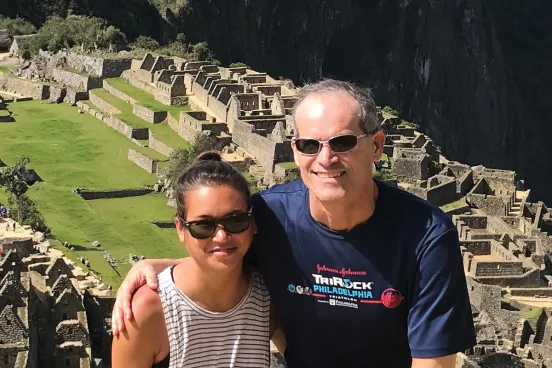
When Gary Jay Kushner, AB ’72, began his legal career in the mid-1970s, he had dreams of becoming the next Perry Mason. So it was by accident that instead of becoming a famous litigator, Kushner became one of the leading experts in food law—a niche area in which relatively few lawyers specialize.
Kushner—a 1975 Georgetown University Law Center graduate—had interviewed with a law firm that specialized in white-collar criminal law and was representing one of the Watergate defendants. It didn’t lead to a job there but instead to a staff counsel position with another of the firm’s clients, the Grocery Manufacturers of America (GMA), a trade association that, at the time, represented the largest food manufacturers in the country, including General Mills, General Foods, Kraft, Conagra, Nestlé, and Procter & Gamble.
“I had never heard of a trade association,” Kushner recalls. “But I needed a job, and I liked the people I interviewed with. I thought, ‘Well, this could be an interesting opportunity. If worse comes to worse, I could do it for a year and have another hole punched in my experience card. If things work out, maybe I’ll stay a while and see where it leads.’ Sure enough, I loved it from day one.”
At GMA, Kushner worked closely with lobbyists to develop positions in response to industry regulations and legislation proposed by Congress and the U.S. Food and Drug Administration (FDA), which oversees dairy, seafood, produce, packaged foods, bottled water, and whole eggs. “You didn’t need to worry about finding case law to support your point,” Kushner says of the work. “It was public policy. You could argue the effects on the country, effects on the economy, effects on an industry—those kinds of things. I liked working across industry sectors, with lawyers and non-lawyers alike, in developing those positions. The public policy side of my work is what I’ve always enjoyed the most.”
The role put Kushner, then a 26-year-old, in contact with key players at major food corporations—and planted the seeds for his interest in building a private practice devoted to representing the food industry. After leaving GMA, Kushner served as vice president and general counsel of the American Meat Institute (now the North American Meat Institute), which represents meat packers like Oscar Mayer and Swift Foods, and focused on the organization’s legal, regulatory, and legislative affairs. The job helped him learn the ins and outs of the U.S. Department of Agriculture (USDA), which oversees meat, poultry, and egg products. He eventually joined Hogan & Hartson (now Hogan Lovells), where he celebrated 30 years in October.
A Growing Specialty Practice
When Kushner started in food law 43 years ago, he could count on one hand the number of fellow lawyers practicing this type of law. Over the decades, the specialty area has gained more lawyers; Kushner’s own team at Hogan has grown to include 13 practitioners in Washington, D.C., who focus on the food industry, up from five when he started there in 1989. “We also have lawyers in offices around the world who handle food matters in the European Union, United Kingdom, Mexico, South America, Africa, and Asia,” Kushner says. “Our practice, like the food industry, has become quite global.”
Kushner’s clients include the world’s top food and beverage producers, manufacturers, and retailers, as well as startups, trade associations, and other nonprofits. “We handle everything—from farm to table and boat to throat,” Kushner says. His practice includes advising clients on product development, labeling, advertising, and inspection; addressing regulatory compliance issues; and representing clients in enforcement proceedings before government agencies and the courts.
In addition, Kushner “has participated in the development of virtually every law and regulation affecting the food industry in the last four decades,” according to his law firm bio. One law that Kushner oversaw from its beginnings is mandated nutrition labeling, which didn’t exist when Kushner was a young lawyer at GMA. Back then, food labels were only required to list the product’s name, ingredients, and net weight, and the manufacturer’s name and address—unless a nutritional claim, such as low sodium or high Vitamin C—was made. It wasn’t until 1990 that Congress passed a law mandating nutrition labeling on food packaging. “Coincidentally, that nutrition labeling law did not apply to meat or poultry,” Kushner says. “It did not apply because it was an amendment to the federal Food, Drug, and Cosmetic Act, which is enforced by the FDA. The USDA, which has far more regulatory authority and a broader array of enforcement tools than the FDA, made nutrition labeling mandatory by regulation.”
Another “historic change” to food law that Kushner witnessed occurred in the early 1990s, when the USDA made it mandatory for meat and poultry manufacturers to utilize the HACCP (Hazard Analysis and Critical Control Points) food safety process following a massive E. coli outbreak at a popular fast food chain in the Pacific Northwest. More than 732 individuals, many of them under 10 years old, became severely ill after consuming contaminated beef patties that were not fully cooked. “HACCP is a plan where the company identifies all potential hazards—biological, chemical, and physical—in the manufacturing of the product, and then determines which of those hazards are reasonably likely to occur in the absence of a specific control,” Kushner explains. The food industry developed and voluntarily began using HACCP in the 1960s, and the FDA required it for a few food product categories in later years. But all food manufacturers were not required to employ HACCP principles in the implementation of written food safety plans supported by comprehensive hazard analyses until 2010, when Congress passed the Food Safety Modernization Act (FSMA)—an FDA law that is designed to prevent food safety problems rather than react to them after they occur.
Kushner says his work on behalf of food laws and regulations have benefited consumers and clients alike. “I think I’ve helped shape regulations and legislation so that they enhance the protections for, and information available to, consumers about food, and are implemented in an affordable, efficient, and realistic way so that regulation isn’t a barrier to the development of healthy, safe, and innovative food products,” Kushner says. “I’ve also helped companies comply with the law and understand their obligations. I tell my clients what they are doing wrong and what I think they could do better, and I try to do it in a way that is accepted and respected.”
“Food is Intensively Regulated”
While there are more food recalls now than in past years, Kushner says it doesn’t mean that food is unsafe. In fact, he says, “food is safer than it has ever been,” thanks to the FSMA’s stringent protocols, which allow for the increased detection of harmful pathogens or bacteria in food products, as well as the food industry’s commitment to produce safe and wholesome foods. Some of those pathogens, Kushner noted, are inherent in the product and can be eliminated through proper manufacturing technologies and the correct handling and distribution of food products.
“Over the 40-plus years that I’ve been a food lawyer, the most significant advancements have been in the area of food safety, both in the work of companies to make food safer to consume and in the ability of technology to employ advanced techniques to identify potential hazards,” Kushner says. “Food is intensively regulated. Companies now have strict quality and safety control procedures that include keeping vast amounts of records about their products that are accessible to FDA and USDA inspectors. In addition, because of advancements in science and technology, there is the ability to identify a pathogen and its source, including a genome of a particular pathogen that can be traced back to other recalls or illnesses reported over a period of years, which could lead to broader recalls. The industry takes food safety very seriously, because more important than enforcement is reputation.”
Food safety, particularly in international markets, will continue to be a top priority for the food industry in the years to come, Kushner says, since safety standards vary from country to country. Part of Kushner’s job entails traveling overseas to educate companies that export food products to the United States about U.S. laws and regulations, which they must comply with in order to receive certification to sell their products here. “We have a global marketplace, and the quality and commitment to food safety is not universal,” Kushner notes. “It has to be universal if we’re going to truly have a global marketplace. Other countries that are not up to snuff with U.S. regulations, which are quite advanced, are moving in the right direction for the most part, but they are going to have to continue to do that, which requires lots of resources.”
The Future of Food Law
In addition to advancing food safety, Kushner says there is an increasing need to develop innovations in food science to meet the growing demands of a global population, and that regulations will need to keep pace with the advancements—a balance that historically has been difficult to achieve. “Science always advances much faster than regulation,” Kushner says, “so that’s going to be a continuing challenge to regulate as our scientific knowledge continues. There are advancements in food technology every day; companies are investing billions of dollars in developing new technologies to make products that meet different consumer desires, provide health benefits, are safer and more readily available, and can be shipped all over the world.”
As for Kushner’s own future in food law, he says that while he has no plans to retire anytime soon, he has reflected on his long career, and hasn’t found it to be lacking. “I have a great deal of satisfaction in the contribution, albeit small, that I’ve made to the food industry and to the food supply,” he says. “I’m very, very proud to be a member of the food industry and to do the kinds of work that I’ve done through the years, and I feel fortunate that I got into it by accident.”






